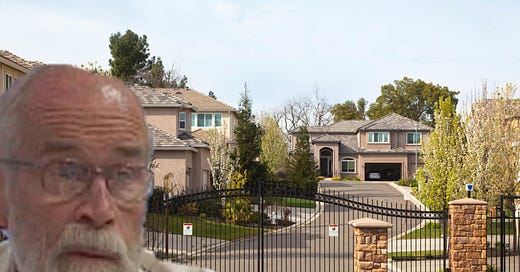Have you ever dared to believe that we’ve been had by a fictitious concept known as public goods that must be provided by a coercive monopoly institution, known as the state?
On February 6th, I published an article entitled The Art of the Proprietary Community, in honor of anthropologist and author of The Art of Community, Spencer MacCallum, who has pondered the same thing.
Article Discussed:
So, what could possibly be the alternative?
After all, we rely on a whole host of public goods to meet our everyday needs: roads, water, sewage, gas, and electricity, to name a few.
It’s a reasonable question.
After all, how many of us have independent off-grid lines of supply for all of these things?
But MacCallum didn’t simply arrive at an answer on his own. In fact, he spent a fair amount of time as a young intellectual getting the book Citadel, Market, and Altar published for his grandfather, Spencer Heath.
What you ultimately have are communities on the market, with the functions of city councils replaced by a proprietor that negotiates for the maximum value on the various services that build and maintain the community.
Instead of taxation - regardless of whether that road gets fixed, or that socialized monopoly can care less how happy you are with the service - you actually have the advantage of collective bargaining on your side to get the most bang for the buck.
The proprietor can be thought of as a mayoral figure who must operate under the dictates of profit and loss and other forms of market discipline in order to stay operational.
From MacCallum to Hoppe
Hans Hermann-Hoppe’s book, Democracy: The God That Failed explains:
Rather than being composed of adjacent pieces of land owned in severalty, then, neighborhoods have typically been proprietary or covenantal communities, founded and owned by a single proprietor who would "lease" separate parts of the land under specified conditions to selected individuals.
Hoppe provides this clarification as a footnote.
To avoid any misunderstanding, the term "lease" is used here to include the sale of anything less than the full title to this thing. Thus, for example, the proprietor may sell all the rights to a house and a piece of land, except for the right to build a house over a certain height or of other than a certain design or to use the land for any other than residential purposes, etc., which rights are retained by the proprietary seller.
Hoppean podcaster Pete Quinones weighed in on this issue in a recent episode.
He calls them covenant communities called HOAs where… your town is based off of a contract. Basically, you sign a contract saying…. these are the things we believe in. These are the “rights” we're giving up in order to have the protection and be around like-minded people. And I really think that's the only way forward. If somebody went in there and started to put this in place, it could be something that could work. And it could mitigate, you know, the, the whole 202 area code Washington DC, at least to a certain extent.
What Works and What Doesn’t
This model would work well if proprietors were locally based in much the same way a landlord is today.
It would not work as desired if we simply had Invitation Homes (owned by Blackrock) to buy out houses and scalp the tenants for anything they can get away with.
Blackrock and other large and far-off corporations are buying out entire neighborhoods with no clear intentions of serving them or adding anything to the trade-off, aside from a seductive teaser sale in return for your collar on a leash.
In present times, we might see this as a byproduct of the Great Reset.
I will have more to say about that in an upcoming article.
External Resources:
BOOK: The Art of Community by Spencer Heath MacCallum
BOOK: From Citadel, Market and Altar: Emerging Society by Spencer Heath
BOOK: Democracy: The God That Failed by Hans Hermann-Hoppe
Pete Quinones Show: Something To Piss Off Everyone
Also Follow Me On:






